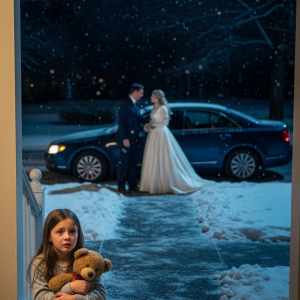My name is Ellie, and I’m twenty-one. For most of my life, I believed my family operated on a simple principle: we take care of our own. I was wrong. The truth is, my family operated like a kingdom, and my younger sister, Kylie, was the princess destined to inherit it all. I was just the one paying the taxes.
The deception began the summer I turned eighteen. High school was over, and I was buzzing with nervous excitement about starting community college. I’d chosen a school close to home—a practical decision. With savings from my part-time cafe job, I figured I could manage. I was, foolishly, counting on my parents’ support.
One evening, they sat me down at the kitchen table. I expected the standard “we’re so proud of you” speech. Instead, I got a lecture disguised as a life lesson.
“You’re an adult now, Ellie,” my mom began, her tone a little too rehearsed. “It’s time for you to learn the value of money, to be independent.”
My dad, usually the quiet one, delivered the final blow. “We’ve decided we won’t be paying for your college. And if y
ou want to continue living here, you’ll need to start paying rent. It’s only fair.”
My stomach dropped. Not a single dime for tuition? For books? Rent—for the privilege of sleeping in my childhood bedroom, under posters I’d put up in middle school? It felt less like a lesson and more like an eviction notice. My parents weren’t struggling for money; my mom is an accountant and my dad a project manager. This wasn’t about need. It was about principle. My principle.
Meanwhile, Kylie, sixteen at the time, lived a life untouched by such principles. She was the golden child—straight A’s, captain of the cheer squad, effortlessly charming. My parents didn’t just love her; they worshipped her. Any protest I could have mounted died in my throat. I didn’t want to cause drama. So I agreed. I would pay their rent, work my way through school, and prove them wrong.
But a quiet, cold anger began to simmer deep inside me. Rent was just the beginning. Tuition, books, gas, groceries—it all piled up. I started taking extra shifts at the cafe, then added small baking gigs on the side, selling cupcakes and cookies for events. My life became a frantic cycle of work and exhaustion. Moving out was a fantasy; the rent in our area was astronomical. So I made a deal with myself: I would endure it. I would keep my head down, save every dollar I could, and the moment I graduated, I would walk away and never look back. That plan became my sole motivation.
Living at home was a constant, grating reminder of the double standard. My parents would ask for my rent check days before it was due, a power play to remind me of my place. At the same time, they showered Kylie with gifts. One afternoon, she came home from a “cheer uniform” shopping trip with an entirely new wardrobe. When I asked my mom if they could at least help with my textbooks for the upcoming semester, she looked at me with disdain. “Ellie, you need to learn to budget better. Kylie doesn’t have these kinds of expenses.”
The sting of those words was sharp. It wasn’t about money; it was about worth.
Kylie, in her blissful ignorance, didn’t help. She’d flaunt her new AirPods—a casual gift from our parents—and complain about how tiring cheer practice was while I was running on three hours of sleep. One night, I came home from a double shift, my body aching, and found her lounging on the couch. “You should get some of these,” she said, pointing to her ears. “They’re amazing.”
“Yeah,” I replied, my voice flat. “Maybe when I don’t have to pay rent.”
She just rolled her eyes and went back to her phone. I wanted to scream, to shake my parents and demand they see the injustice. But I knew it was pointless. They had their princess. I was just the tenant. So I held my tongue and clung to my plan. Survival was the only option. The escape would come later.
My first two years of college were a blur of exhaustion. I was up at dawn for classes, rushed to the cafe for a chaotic shift, and came home late at night to a mountain of homework. Weekends weren’t for rest; they were for baking, for hustling, for trying to scrape together enough money to stay afloat. The financial stress was a constant weight. There were weeks my bank account balance was a cruel joke. One time, after buying a $200 textbook, I asked my mom if she could cover groceries for the week. She looked at me as if I’d asked for a kidney. “Ellie, we’re already doing so much for you by letting you stay here.”
Letting me stay here. As if my rent checks weren’t cashed on the first of every month.
By the time Kylie was a senior in high school, my parents’ favoritism had escalated into a full-blown production. Her college search became the family’s singular mission. They went on lavish campus tours, returning with bags of university merchandise. They bought her a car—a shiny SUV—so she’d have something “reliable” at school. They planned her monthly allowance, a generous sum to cover all her needs and wants. All of this was happening while I was stretching my graduation timeline because I couldn’t afford a full course load.
The injustice was so blatant it felt like a physical presence in the house. I started avoiding them, eating my ramen and peanut butter sandwiches in my room rather than watch them plan Kylie’s perfect future. The person I was closest to during this time was my Grandpa Hank. He was the one who taught me to bake in his bustling bakery, showing me that hard work could be a source of joy. Since retiring and leaving the business to a manager, he and my grandmother had been traveling the world. We didn’t talk often, but one night, feeling completely overwhelmed, I called him.
I didn’t hold back. I told him everything—the rent, the bills, the constant struggle, the car they bought Kylie, the college fund they were building for her while I drowned in debt. He listened patiently, his silence a comforting presence on the other end of the line. Then, he interrupted me, his voice slow and deliberate.
“Ellie,” he said. “Didn’t your parents use the money I gave them for your education?”
I blinked. “What money?”
There was a long pause. When he spoke again, his voice had changed. The warmth was gone, replaced by something sharp and cold. “When you were sixteen, your grandmother and I put aside fifty thousand dollars for your college fund. We gave it to your parents to manage for you. Are you telling me they never mentioned it?”
The world tilted. Fifty thousand dollars. A sum that would have changed everything. “They never said a word,” I whispered, my voice shaking. “I’ve been paying for everything myself.”
Grandpa let out a heavy sigh, thick with years of disappointment. “Ellie, that money was for you. Not for them. Not for Kylie. For you.” The anger began to creep into his tone. “They lied to me, Ellie. And they lied to you.”
The years of struggle, of working myself to the bone, of feeling like a failure—it all crashed down on me. They hadn’t just let me struggle; they had actively ensured it, all while holding a fortune that was rightfully mine.
“I don’t know what they did with it,” Grandpa said, his voice now laced with cold fury. “But I’m going to find out. And Ellie? You’re not alone in this anymore. I’ll handle it.”
After we hung up, the numbness gave way to a white-hot rage. They had stolen from me. They had watched me suffer and then had the audacity to lecture me about responsibility. But beneath the anger, a new feeling flickered to life: hope. If Grandpa said he would handle it, he would. For the first time in years, someone was in my corner.
Grandpa Hank was a man of his word. A few days later, he called me. “I talked to your parents,” he said, his voice grim. “They admitted it. They were ‘saving’ the fifty thousand dollars for Kylie’s college.”
The confirmation was a gut punch. They had taken my lifeline and handed it to the person who needed it least.
“They had no right,” Grandpa continued, his voice seething. “I’ve made it clear: they will repay every last cent. And if they don’t, they’re out of the will.” There was a pause. “And you’re not staying there another night. There’s a guest room here with your name on it. Pack your things.”
Moving out was the easiest decision of my life. I didn’t bother to tell my parents; they were out. I left a short note on the counter—“I’m with Grandpa. Don’t call me.”—and walked out for good.
The peace, of course, didn’t last. The next morning, the calls and manipulative texts began. My mom left voicemails oscillating between tearful apologies and accusations that I was overreacting. My dad sent texts about “working through this as a family.” I ignored them all. They weren’t sorry for what they did; they were sorry they got caught. They showed up at Grandpa’s house, but he met them at the door, his face like granite.
“If you’re not here to apologize and discuss how you’ll repay the money you stole,” he said, his voice echoing from the porch, “you can leave.” They left.
The fallout hit Kylie almost immediately. With a $50,000 debt to repay, my parents had to cut her off. The weekly care packages, the spending money, the dorm luxuries—all gone. Suddenly, Kylie had to get a part-time job. I saw it on her Instagram: a mirror selfie at a boutique with the caption, “Working girl adventures lol.” I laughed out loud.
It didn’t take long for her to crack. She called me one night, sobbing. “My life is ruined!” she wailed. “Mom and dad cut me off, and it’s all your fault! If you hadn’t told Grandpa, none of this would have happened!”
The audacity was breathtaking. “My fault?” I said, my voice dangerously calm. “Kylie, welcome to the real world. You’re just now experiencing what I’ve been living with for years. If you want someone to blame, talk to the people who stole my college fund to build your princess castle.” I hung up.
Her social media became a cringe-worthy stream of pity posts about how hard “college life” was, complete with pictures of instant noodles. She was acting like getting a job was an insurmountable tragedy. The sympathy she expected never quite materialized.
Meanwhile, my life was finally beginning. Grandpa didn’t just give me a home; he gave me a purpose. He saw the passion I had for the bakery and began mentoring me, teaching me the business from the ground up. He helped me get my finances in order and encouraged me to take a full course load to finish my degree. I was thriving.
Shortly before I graduated, Grandpa sat me down in his office at the bakery. He slid a folder across the table. “I’ve been thinking about the future,” he said, a proud smile on his face. “You’ve earned this, Ellie. I want you to take over the bakery when you’re ready.”
Tears filled my eyes. For so long, I had felt invisible, my hard work completely unacknowledged. But Grandpa saw me. He always had.
Today, I run the bakery. It’s my life, my passion, my future—something I built with my own two hands, with the help of the only family member who ever truly believed in me. I rarely speak to my parents. They still send the occasional guilt-ridden text, likely clinging to the hope of getting back into the will. They have no idea Grandpa removed them months ago. It’s not my problem. I’m too busy creating a life for myself, one built on integrity and hard work. Let them watch from the sidelines. I’m moving forward, and I’m not looking back.
The day I officially took over the bakery, Grandpa threw a quiet celebration. No fanfare, no ribbons—just the two of us, a perfectly balanced lemon tart, and a small key placed gently in my palm.
“This is yours now,” he said, eyes glassy but proud. “You’ve earned every inch of it.”
I clutched the key like it was made of gold. In a way, it was. Not because of its value, but because of what it symbolized—freedom, vindication, and finally, love without condition.
But just when I thought I could begin to breathe, the past clawed its way back in.
It started with an envelope.
I found it one morning on the bakery’s front step, slipped under the door before we opened. No address, no stamp. Just my name in my mother’s handwriting.
I stared at it for a long moment before opening it. Inside was a letter—and a check.
The letter was short, neat, impersonal.
Ellie,
We’ve gathered as much of the money as we could. Your father took out a loan to cover the rest.
Consider this repayment.
We hope, someday, you’ll understand our choices.
—Mom
The check was made out for exactly $50,000.
I should’ve felt victorious. But all I felt was empty. This wasn’t accountability. It was damage control. They hadn’t apologized. They hadn’t asked to see me. This wasn’t for me—it was for their own conscience, their own reputation.
I didn’t cash the check.
Later that week, Kylie showed up.
I was closing the shop for the evening when I spotted her reflection in the glass. She looked smaller somehow, her usual polish dulled by fatigue. She was holding something—one of my cupcakes, half-eaten, bought by someone else. Maybe a friend. Maybe herself.
I unlocked the door cautiously. “What do you want?”
She didn’t answer right away. She stepped inside, looked around the bakery like it was a museum.
“This is really nice,” she said finally. “You did all this?”
I nodded once, arms crossed. “What are you doing here, Kylie?”
“I got fired,” she blurted out. “From the boutique. The owner said I was… entitled.”
I said nothing.
“And I—I just wanted to talk. I know we’re not… close.”
I raised an eyebrow. “You mean you’ve ignored me your entire life until your comfort started to crack?”
Her cheeks flushed. “That’s not fair.”
“Fair? You want to talk about fair?” I laughed, bitter and tired. “Let’s talk about the car. The allowance. The free ride. The way Mom and Dad made me pay rent while you got a throne. The way they stole my college fund to make sure your crown didn’t slip. So no, Kylie, you don’t get to cry to me about fairness.”
“I didn’t know!” she snapped, voice rising. “They never told me about the money!”
“And yet you benefited from every cent.” I stepped closer, voice cold. “And you never questioned why your older sister was killing herself with work while you lived like royalty.”
She opened her mouth, then shut it.
Silence settled between us.
Finally, she said, “I’m sorry, Ellie. I really am. I was stupid. And selfish. But I didn’t know how things really were. I didn’t want to see it.”
I studied her face. She looked sincere—but sincerity wasn’t the same as change.
“I believe you’re sorry,” I said. “But that doesn’t mean I trust you. Or them.”
Kylie nodded slowly. “I get it.” She turned to leave, then paused at the door. “I’m… I’m trying to be better. I’ve started night classes. I’m living with a roommate now. No help from Mom and Dad.”
I nodded. It wasn’t forgiveness. But maybe it was a beginning.
Weeks passed. Then months.
I finished my degree—at last—and stood on the stage, my cap and gown heavy with meaning. Grandpa was in the front row, beaming like the sun. No parents. No Kylie. Just the one person who’d always seen me.
After the ceremony, we went back to the bakery. There was a small surprise party—a few friends, some regulars, a banner that said, “SHE DID IT!” in frosting-piped letters.
But as the laughter echoed and the music played, Grandpa pulled me aside.
“There’s something I need to tell you,” he said.
My heart skipped. “What is it?”
“I’ve been diagnosed with early-stage cancer.”
The world narrowed to a pinpoint.
“What?” I whispered.
“It’s treatable,” he said quickly. “I’m starting chemo next month. The doctors caught it early.”
I nodded numbly. My hands trembled.
“I didn’t tell you before because I didn’t want it to overshadow your final year,” he added. “But you should know now. You need to be prepared to run the bakery fully, in case I need to step away.”
I nodded again, swallowing back tears.
I wouldn’t lose him. Not now. Not after everything.
Treatment began. The bakery became my sanctuary—and his too, between rounds of nausea and exhaustion. He still came in when he could, refusing to let the sickness win.
The worst moment came when I found him slumped on the floor behind the counter one afternoon, too dizzy to stand. I called an ambulance, heart in my throat.
He recovered, but the doctor warned us: “You’ll need support. This is going to be a marathon, not a sprint.”
And strangely, that support came from the last people I expected.
Kylie visited the hospital.
She brought homemade soup, sat by his bed for hours. She helped me at the bakery on weekends. She didn’t ask for praise. She didn’t post about it. She just… showed up.
“I don’t want anything from you,” she said one night while we were closing shop. “I just want to do something right for once.”
For the first time, I believed her.
As the weeks went by, my parents began reaching out again—this time with less pretense.
They showed up at the hospital, too. Grandpa refused to see them at first, but eventually, he relented—on the condition that I would be the one to decide when they could visit.
I kept my distance, until one afternoon, my mother cornered me outside his hospital room.
“Ellie,” she began, her eyes tired, voice low. “I know we can never undo what we did. But we are… sorry. Truly.”
I stared at her. This woman who had once looked through me like glass now seemed older, brittle.
“I don’t forgive you,” I said simply. “But I’m not angry anymore. I’ve built a life without your approval. Without your money. Without your love.”
Her eyes welled up.
“But I’ll say this. If you want any kind of relationship with me—it’s on my terms now. No lies. No guilt. Just truth. And effort.”
She nodded. “We’ll try.”
Grandpa’s treatment ended with cautious optimism. The cancer shrank. The doctors smiled.
We threw a small celebration at the bakery. Grandpa made his famous pecan pie. I added gold leaf to the whipped cream. Kylie brought candles. My mother brought coffee.
It was awkward. It was imperfect. It was—something new.
Not a happy ending. But a real one.
A year later, I was invited to speak at a local college’s business panel.
I stood at the podium, looking out at a crowd of wide-eyed students, and I told them my story—not as a victim, but as a survivor. A builder. A businesswoman.
“No one gets to decide your worth but you,” I said at the end. “Not your parents. Not your past. You do. So claim it. Bake it. Fight for it.”
The applause thundered.
And I smiled.
The bakery now bears my name: Ellie’s Oven. There’s a picture of Grandpa and me on the wall, flour on our noses, grins wide.
Kylie helps manage our social media, working part-time while finishing her degree. We’re not best friends. But we’re sisters. Finally.
My parents come by once a month. They stay quiet, respectful. Sometimes they buy cupcakes. Sometimes they just sit and watch.
I let them.
Because I’m not the same girl who begged for their approval.
I am Ellie. And I built this life with burnt hands, sleepless nights, and a heart that refused to stop hoping.
They can watch.
But they don’t get to take credit.




